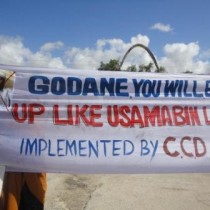
AFGHANISTAN REPORT: DEATH OF BIN LADEN AND LOCAL DYNAMICS
Divided opinions on the effect of Bin Laden’s death on the future of Al Qaeda and Taliban
Military successes in Afghanistan, but Taliban pushback on hearts and minds campaign
Kabul, 13 May 2011 – Sixty-eight percent of men interviewed in five districts of Afghanistan and Kabul University said the death of Osama Bin Laden is good news, according to a new report released today by the International Council on Security and Development – ICOS.
However, high levels of respondents who do not think that Bin Laden’s death is good news were found in Kabul University, where 36% said it was bad news, and Marjah District in Helmand Province, where 71% said it was bad news.
Interviewees Split on Impact of Bin Laden’s Death on Al Qaeda and the Taliban
When asked if Bin Laden’s death means Al Qaeda is finished, overall responses were split around 40%/40% with the remainder having no answer or unwilling to respond. However, in Lashkar Gah and Marjah in troubled Helmand province, high numbers of interviewees do not believe his death means the end of Al Qaeda: 50% of respondents in Lashkar Gah, and 59% in Marjah, think Bin Laden’s death will not finish Al Qaeda.
Overall almost 50% of interviewees believe that Bin Laden’s death will hurt the Taliban, with the remainder split between ‘it will help them’, ‘no effect’ or no answer. The highest numbers of respondents who believe that his death will help the Taliban are found in Lashkar Gah and Kandahar City where about 25% of interviewees take that view.
The report quotes on the one side a 19-year-old man from Panjshir, who said: “I am happy that Osama is dead as he killed Ahmad Shah Masoud, one of the leaders of Afghanistan,” and on the other a 17-year-old student from Kabul University as saying, “Osama Bin Laden fought our holy war against the Russians so we are very sad to hear of his death.”
Good news – Military Achievements Unquestionable
Over 1400 interviews on perceptions of military interventions and hearts and minds were also conducted in 13 districts in the north and south of the country, and at Kabul University.
Respondents in nine out of fourteen research locations, which included the most contested districts in the south, think NATO and the Afghan Government are winning the war. There is widespread support from interviewees for the international community’s Transition process, with 80% of respondents in the north and 61% in the south supporting it.
There is also widespread support among those interviewed for negotiations with the Taliban: 61% in the south said they would support this. Opinions on the effectiveness of the Afghan Army are positive, with 82% of interviewees in the north believing it to be effective and 67% in the south.
Eighty-two percent of respondents in the north think the Afghan Police are effective, but this view is held by only 30% of interviews the south, where 58% think the police are not effective.
Bad news – Hearts and Minds campaign under siege
“Overall in the north there is good news for transition, but there are areas of weakness related to the hearts and minds campaign throughout the country,” said Norine MacDonald QC, President and Lead Field Researcher for ICOS. “The relatively positive news in the northern provinces is offset by the decrease in support among interviewees for the international presence in the southern provinces.”
“Military operations have created “blowback” through negatively impacting the hearts and minds of those we interviewed in the south,” said MacDonald. “The local population in the south is traumatised, isolated, emotionally volatile and easily manipulated by outside actors. Thirty percent of those interviewed say the emotion they feel on a regular basis is anger, while 49% feel sadness.”
High levels of Taliban intimidation were reported. Almost 38% of Afghans interviewed in the south say that they do what the Taliban tells them because they have to.
The report described a Taliban “pushback” on key propaganda points. Sixty-three percent of men interviewed in the south think that the international forces do not protect the local population and 56% say their opinion of foreign forces is more negative than one year ago.
“There is a generalised belief that the international community does not protect, and does not respect the Afghan people or their culture and religion,” said Jorrit Kamminga, Director of Policy Research for ICOS. “Support is lacking on these indicators.This has been compounded by a wave of recent negative news stories such as the burning of the Quran and the Kandahar prison break.”
“A hearts and minds surge is needed to ensure a durable transition,” said Kamminga, “There must be positive impacts in the lives of the local people to counterbalance the negative impacts of the military operations.”
Leave a comment
| Copyright © 2009 - 2024 Sunatimes News Agency All Rights Reserved. |
| Home | About Us | Diinta | Reports | Latest News | Featured Items | Articles | Suna Radio | Suna TV | Contact Us |
 0
0 









AFGHANISTAN REPORT: DEATH OF BIN LADEN AND LOCAL DYNAMICS
For immediate release New report: Sixty-eight percent of Afghan men interviewed said Bin Laden’s death is good news